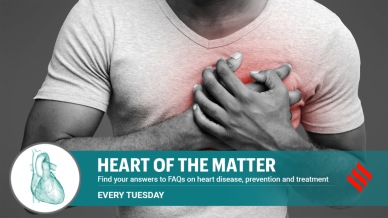Patient had a heart attack at 32 although he weighed normal, didn’t smoke or drink, played table tennis on weekends: What was his trigger?
Know which kind of hidden body fat can raise your risk

On the surface, this heart attack patient of mine did not have any of the traditional risk factors. A young researcher, all of 32, he was neither a smoker nor a drinker, wasn’t overweight and played table tennis over the weekends. But he loved eating out frequently and this habit of his led to his abdominal obesity, often measured by a high waist circumference to height ratio. Let’s find out why this is a significant risk factor for heart disease, independent of a person’s total body fat or body mass index (BMI).
Abdominal obesity or fat deposition around the stomach and core organs, what is commonly known as belly fat, is one of the biggest threats to cardiovascular health. This fat is metabolically active, which means it is a part of body processes unlike typical white fat which primarily stores energy. What this type of fat does is release inflammatory chemicals and hormones that cause insulin resistance, high blood pressure and elevate low density lipoprotein (LDL) or “bad” cholesterol. All of this can damage artery walls, stiffen blood vessels and block them, resulting in a heart attack.
Abdominal obesity is usually acquired, which means it is triggered by sedentary lifestyle, unhealthy diet, stress and genetics.
Why abdominal obesity affects the heart
A layer of fat is located between the heart’s muscular wall (myocardium) and the membrane surrounding the heart (pericardium). This is called the epicardial fat which can be problematic in excess. More than the direct proximity of belly fat, the inflammatory chemicals and oxidized LDL particles released by it leads to plaque deposition in the arteries. Chronic inflammation and cell damage can also damage the endothelium, the lining of blood vessels, and make the LDL sticky. The increased blood volume and the heart pumping needed to supply excess fat tissue stress out the heart, leading to increased wall tension and dilation of heart chambers. This makes the plaque vulnerable to getting dislodged. Once it does, blood rushes in to close the wall tear and forms a huge clot over it.
In some cases, fat can directly infiltrate the heart muscle, leading to structural changes and heart failure.
What do studies show?
A decade ago, I had myself done a study at KMC Manipal and found that people with excess abdominal and epicardial fat had a higher risk of blockage in the heart. Those with skinny fat (normal BMI but excess fat tyres around the midsection) were found to have worse inflammatory workers. A 2018 study by the Journal of the American Heart Association, which had tracked 500,000 women, showed that compared with BMI, waist-to-hip ratio was 18 per cent stronger as a heart attack predictor in women than six per cent in men. A 2020 study of 22,000 people had shown how abdominal obesity not only increases the risk of a first heart attack or stroke but also the risk for recurrent heart attacks.
Studies have also shown that people with higher levels of visceral fat are more likely to suffer a stroke often at an earlier age. Belly fat is one of the primary reasons for early heart attacks in our country.
How to eliminate belly fat?
Now this doesn’t involve too much. Get moving, be regular with your exercises, eat a clean, balanced meal, sleep well, give up processed foods, stop smoking and alcohol. Add strength training to your exercise routine to build lean muscle mass, which causes you to burn more calories at rest and during exercise.
(Dr Shetty is lead cardiologist and medical director, Sparsh Hospitals, Bengaluru)